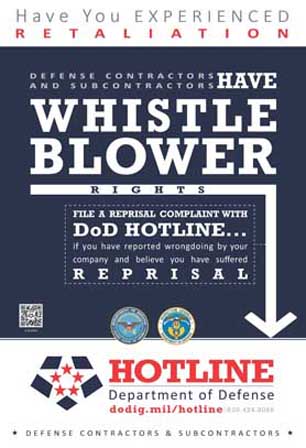Defense Department IG Launches Campaign on Whistleblower Rights for Contractors
The Defense Department’s Office of the Inspector General launched Thursday a social media and poster campaign to spread the word of whistleblower protections afforded to defense contractors and subcontractors.
 The U.S. Defense Department Office of the Inspector General (IG) launches today a social media and poster campaign to spread the word of whistleblower protections afforded to defense contractors and subcontractors.
The U.S. Defense Department Office of the Inspector General (IG) launches today a social media and poster campaign to spread the word of whistleblower protections afforded to defense contractors and subcontractors.
On July 1, 2013, amendments to Title 10, section 2409, extended whistleblower protections to employees of Defense Department subcontractors, no longer just to employees of prime contractors and federal employees.
The enhancements also expand the types of information protected, to include disclosures of abuse of authority in the management of a Defense Department contract or grant, violations of rules and regulations related to a Defense Department contract and initiation of or participation in any judicial or administrative proceeding related to waste, fraud or abuse on a Defense Department grant or contract.
The IG’s office noted an increase of about 20 whistleblower cases overall since enactment of the amendments last year, officials say. However, they do not know whether the enhancements spurred the increase since before July 2013, contractors and subcontractors filed for protections, but their cases simply had to be dismissed because they were not protected under the law, explains Marguerite Garrison, deputy inspector general for administrative investigations.
The complaints filed last year include alerts of waste, fraud and abuse; mismanagement; public health and safety issues; and violations of laws, rule and regulations relating to a defense contract.
Subcontractors who might have filed complaints before July 1, 2013, are not grandfathered under the amendments and cannot have their complaints reviewed again.
“It wasn’t a clean sweep with the amendments that went into effect last July,” says Nilgun Tolek, director of whistleblower reprisal investigations. “It didn’t say, ‘From here on, everybody is covered under this version of the law.’ It applies … to new contractors and to contracts that are modified if the new clause is included in that contract redoing, and also to any new task order” made after July 1 of last year.
In addition to adding subcontractors to the protective circle, the law broadened to whom employees can make complaints in order to be protected, Tolek says. “Making a protective disclosure, say raising a concern about fraud, if you did it to your boss as a contractor, it wasn’t considered a protected communication. It had to be made to a defense official.” Under the amendment, speaking to the boss as a contractor is a protected communication.
The employee can make the disclosure to any of the following:
- Member of Congress or representative of a committee of Congress.
- Inspector General.
- Government Accountability Office.
- A Defense Department employee responsible for contract oversight or management.
- The Department of Justice or an authorized official of a law enforcement agency.
- A court or grand jury.
- A management official or other employee of the contractor or subcontractor who has the responsibility to investigate, discover, or address misconduct.
In order to be protected, whistleblowers must make a protected communication or disclosure before an employer takes unfavorable personnel action against them, or withholds a favorable action, Tolek explains.
The enhancements also apply a higher standard of proof for showing that the agency would have taken the unfavorable action even if the employee hadn't made a protected disclosure. Additionally, complainants now have three years to file. “That’s a really long time,” Tolek says.
All whistleblower complaints must initially be filed through the Defense Department whistleblower hotline before being investigated.
A whistleblower complaint triggers at least two investigations—the one regarding the employee’s complaint of reprisal and a probe into the claim that might have triggered the adverse action, be it reports of waste, fraud or abuse, or a criminal allegation, says Patrick Gookin, the Defense Department’s whistleblower protection ombudsman. Whistleblower complaints cannot be anonymous, he says.
In fiscal 2013, the office received 1,700 complaints for administrative investigations, of which 995 were complaints of reprisal, Garrison said. Not all claims were fully investigated.
IG investigators, employees and defense contracting officers are among the officials circulating information posters on whistleblower contractor rights, and getting on the social media bandwagon. They can be followed on Twitter via handle @DoD_IG.




Comments